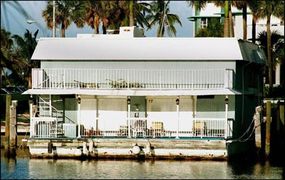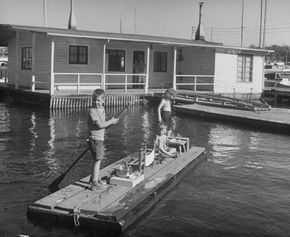Houseboat Maintenance, Rules and Regulations
As we mentioned on the previous page, houseboats are generally constructed with one of two materials: fiberglass or wood. (Manufacturers build with metal like steel and aluminum, too, but such materials are less common on houseboats because they tend to rust.) There are advantages to both, but most houseboat buyers look for boats built with fiberglass. Fiberglass is often a popular material in airplanes and sports cars because it's light and strong at the same time. It's great for boats because it doesn't require much maintenance. It's also much easier to get a fiberglass boat financed and insured because of the low risk of damage.
Wooden boats have an advantage over fiberglass boats because they're much cheaper. Historically, wood is also the oldest material used for houseboat building, and many people find a wooden boat more attractive for its rustic appeal. But that's about as far as it goes -- finance companies and insurance companies are less willing to work with you because of the wear and tear that comes with wood, and the boats are much harder to maintain. When submerged in water, wood will rot much faster than when it's on land, since fungus spores thrive on the water and will multiply and destroy the wood. Because of this, wooden boats need to be checked often for rot. Boaters can apply marine spar varnish, a protective, waterproof film, or epoxy to reinforce the structure.
Advertisement
Regardless of the material, any houseboat requires a certain amount of maintenance. All houseboats have through-hulls, or holes in the hull, that let outside water into inside systems like toilets, showers and sinks. It's necessary to check these holes for any leaks because extra water let into these systems will flood the interior and cause all sorts of damage.
Rules and Regulations
Although the laws that apply to houseboats vary from state to state and across international borders, you can expect the same kind of maritime rules and regulations placed on any other boat. These include laws against driving while intoxicated on drugs or alcohol, operating an unregistered boat, failing to turn on the necessary boat lights before sunrise or after sunset, littering or dumping waste into the water, cruising into prohibited areas and not having the correct safety gear on board. There are many more, which you can read here. Marinas may also have their own rules.

In addition to the above oversight, the U.S. Coast Guard also has the right to search boats, including houseboats, without probable cause [source: GPO]. This is the opposite of other motor vehicles -- the police can't search your car, for instance, if there isn't probable cause of a crime.
To learn about houseboats around the world, read the next page.
